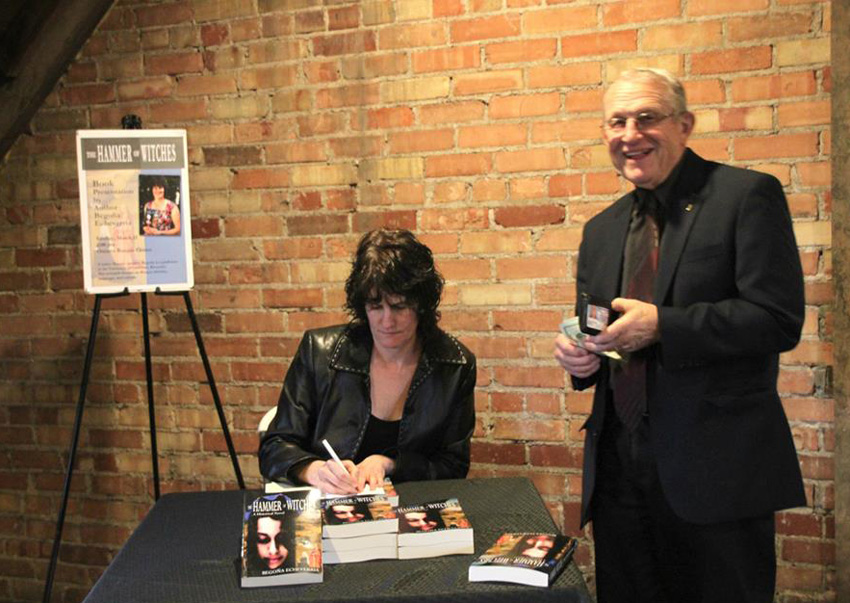Sydney, Australia. They say the world is small, and even more so for some Basques in the Diaspora whose network can go from the Valley of Baztan, via California, to Sydney, Australia. That is the case of Begoña Echeverria, who is a descendent of Basques born in California, and a good example of the Diaspora not being limited in regards to the preservation of Basque culture, but that it can also create, disseminate and share it.
Echeverria is a Basque biologist, anthropologist and professor at the University of Riverside California, who has recently debuted in the world of literature with her first book The Hammer of Witches. The story is based on the witch trials that took place in 1610 in Zugarramurdi, in Baztan (Navarre), in the valley where her family is from. The book was written in English and published by the Center for Basque Studies at the University of Nevada, Reno.
Jump to Australia
After an intensive book presenting tour through US Basque clubs, Echeverria made the leap to the antipodes to introduce her work in Australia. There we saw her participating in Korrika this weekend organized by the Gure Txoko Basque club in the middle of the Sydney Bay. The world is small, yes it is, and as we Basques say….txapela buruan, ta ibili munduan.

[Begoña Echeverria, with an orange rain slicker, participating in Korrika in Sydney with members of the Gure Txoko Basque club (photoSydneyEE)]
“The Sydney Basque club welcomed me with open arms,” Begoña told us. “When organizing the tour, I was looking for places with Basque club, universities and independent book stores, and Sydney has all three. They were also holding the Society of Australian Historic Novels conference and I was hoping to share my book there to introduce it to other writers.
Serendipity, luck, coincidence, also had a lot to do with this trip, according to the author. “The president of Gure Txoko, Ruben Alvaro, and Izaskun de Allende have been incredible in organizing everything. Izaskun is the administrative assistant at the Cervantes Institute, and so we were able to organize a presentation there (tomorrow), and another at the Basque club day after tomorrow. I feel like I am in good hands.”
Witches in flesh and blood
The presentations provide an opportunity to introduce this dark episode of Basque history to the Australian public. “I worked hard so that the historic details were correct; I spent hours and hours, delighted, researching in archives, museums and libraries to achieve this historical accuracy, and it is very gratifying to see that readers appreciate it. I also included texts in Basque, to also transmit some of the language and culture to the readers,” she said.
Echeverria believes that many in the US Basque community know about witchcraft especially thanks to stories and songs transmitted by their elders. “That is my case at least. But this version is very different from the real history of “sorginak” when the inquisition accused and judged people of witchcraft, in Logroño in 1610, real facts on which this book is based.. I found this story over and over during my academic research and so I decided to write the novel,” she recalls.
Even though she conducted research from California, the story is very close to Begoña. “It has been a cathartic and eliminating experience, especially since the facts that the book is based on took place in Baztan, the valley that my family comes from.”
The US, Australia and…Euskal Herria?
The writer presented her book in universities and Basque clubs in California (Claremont and Riverside); Washington, DC, New York, Idaho (Boise and Homedale) and Ontario, Oregon. “I am finalizing presentations in Denver, Nevada (Gardnerville and Reno); Sarah Lawrence College (New York) and Rhode Island. I am excited to be able to add Sydney as one of my first international stops but I hope it won’t be my last!”
This novel has been very satisfying for this Basque Californian, but she still hopes to do something with her mother tongue. “My dream is that the novel be translated into Basque, and maybe into Spanish and French. I was at the Durango Book Fair in 2014 and I met with some publishers, in hopes of achieving that goal. My fingers are crossed.”
In the coming months, Echeverria hopes to travel to the Basque Country with her group Noka, a trio of Basque-Californian women who sing in Euskera. They recorded their latest album in the beginning of the year in the US, along with Mikel Markez, and it will be available shortly. It’s another story, another adventure that we will tell you about. But all indications are that the effort and creativity of this Basque-Californian will continue to create bridges between the Diaspora and the Basque Country.







 Send to a friend
Send to a friend Add comment
Add comment








